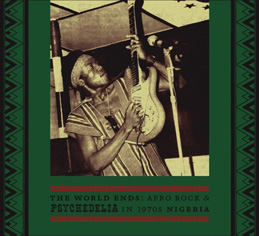V.A. : "The World Ends"
- Oct 6, 2016
- 2 min read

Soundway Rec. V.A. : The World Ends :
Afro Rock and Psychedelia in 1970s Nigeria -2CD- (NI,1971-1979)****°
It is only the last few years that lesser known movements from the African music scene are being documented better. Soundway is one of those well informed labels for restoring some parts of that history with a bit more detail and with accuracy. The label did already one compilation on Nigerian afro-rock and psychrock some years ago. With this new, double CD or 2LP compilation they completed the picture even further. And simultaneously some of the albums included were also re-released.
Included in the booklet is a historical setting of the scene. They explained how Nigeria's independence after English occupation developed at first the popular and happy sounding Highlife style. This began to work in favour of certain ethnographic areas, while the afro-'beat' music became another and new expression under the influence of British examples (mentioned are the common Shadows/Beatles domination, and the more straight Animals, Rolling Stones, Gerry & The Pacemakers, Yardbirds influence), from which I guess the early period has not been documented yet. The booklet mentions how at first people had some bad associations with the electric guitar so that the horns were still dominating. But after a while the guitarists became so popular it was even hard to find anyone willing to play the drums. Around '67 the ethnic/economic/religious-based '67 Biafra war was difficult for a further development of anything. At first funk and American influences became more dominant (James Brown, Ottis Redding, Wilson Pickett) while covering the Western examples. Geraldo Pino, the Nigeran James Brown turned the Highlife style more down, turning people up to funk more completely. After the war the army sponsored the new rock style because it was the voice of the people trying to find something new and fresh. It was this creative period, a mixture of psychedelic rock, afro-rock and funk, which got an overview in this compilation. Full background explanations of the bands/singles and LPs were also added.
The label chose amongst singles and LP's those tracks which fitted well, showing overall similarities in expression and how there truly was a psychrock style which incorporated funky and afro-beat rhythms, some small electric guitar fuzz solos, song orientation in a few different languages including English, occasional African responding, psych organ solos and accents, and here and there harmony vocals. Most of the tracks are like that. The last tracks of CD1 are more balladeers, soft rockers with warm lead voices. In that influence, The Lijadu Sisters distinguish themselves well with their soulful vocals. From the second CD the popular sounding professionalism of The Black Mirrors is worth taking out as well. Action 3 / Action shows more dominant organ/guitar solos making them special. The Fela related Ofo The Black Company I already highlighted on the “Nigeria 70” compilation. They showed an extra level of experience which except the usual elements even included some flute. The band had a real ill fate despite their huge talents.
A rather essential compilation, although the psychedelic elements themselves remain on a common sense of inspirations. Very enjoyable and with a documentary full booklet.



























Comments